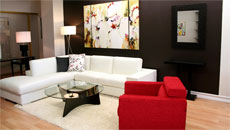Going green has been a theme for businesses, homeowners, and even cities for the past several years. With talk of reducing waste, limiting our footprint, and making environmentally-friendly decisions, living a green life is easier than ever.
What exactly is eco-friendly living? Eco-friendly simply means something is not harmful to the environment. It’s a term plastered on products so often it’s hard to know how green our efforts actually are. Making decisions for your home that contribute to a healthier environment, help to conserve our natural resources, or prevent pollution to land, water and air will help you live an eco-friendly life.
For some, this might mean potting plants or repurposing wherever possible while for others it may mean updating all floors, faucets or furniture with sustainable materials or energy-efficient appliances.
But is eco-friendly budget-friendly as well? Jared Kress, founder and owner of The Eco Floor Store, clears up why homeowners might hesitate to make green choices: “I think the challenge is not selection in the market place because there’s an overwhelming selection of environmentally-friendly products,” he says. “The challenge is typically that media portray environmentally-friendly as being a more costly option and that’s just not true.”

While certain options may be less expensive or comparable to their competition, consumers can also save money while saving the environment by reusing what they already have. Repurposing reduces waste or unnecessary purchases and often produces visually-appealing pieces. Determine what you actually need in your space and consider investing in pieces that double as both decorative and functional.
Buying locally made products can reduce the negative environmental impact associated with importing while supporting designers who make responsible decisions. Being conscious of both the production and distribution methods of products you purchase can reduce waste and force companies to consider more eco-conscious options for manufacturing and delivering their goods.
Consider sustainable plants such as bamboo or rattan, use textiles made of organic materials or free of toxins or irritants, and ask for fair-trade products. Designers these days are thinking beyond just beauty and function with the use of materials such as recycled tires and water-based ink to create environmentally- friendly accessories.
Homes can easily be updated by switching all lights to energy-saving bulbs. If bigger changes are in your budget, eco-friendly options include cork flooring, concrete countertops, wallpaper made of recycled materials and the increasingly popular addition of reclaimed furniture.
“Reclaimed is the new black,” Kress says without hesitation. “It seems to be the trend for things right now. Anything and everything reclaimed.”
And while that might sound like another budget-friendly option, it highly depends on the availability. “Some of the unfortunate part of the reclaimed aspect of it is the amount available of it. Our pricing would be dictated on the availability of stock and sometimes reclaimed items are harder to get a hold of than something mass-manufactured,” he says. “It depends on what the consumer is after.”
If you’re looking for inspiration, many commercial spaces and new developments will offer a glimpse into what is up and coming in the eco-friendly market. In an effort to reduce their environmental impact and create long lasting and beautiful spaces, designers are leaning heavily towards open and airy spaces that incorporate sustainable materials along with repurposed pieces.
“You’ll come in to an office building or a doctor’s office and see a really cool looking floor or a feature wall and that’s what intrigues homeowners to say, ‘oh wow, that would be a really cool option’. The architects, designers, and builders on the commercial side seem to lead and influence the residential home market.”

Eco-friendly updates to a home don’t have to be overwhelming or all happen at once. “Start small scale and see how that integrates with your home,” says Kress. He suggests starting with a design scheme and knowing what products and finishes are available for what you are trying to accomplish. “Once you know the design concept and the elements within it, then it becomes a very simple process of shopping.”
Creating an environmentally-friendly home can bring benefits beyond a greener world. Lower quality and older surfaces are often made with harmful chemicals that can affect your home’s air quality. Ensure you’re not harming your health by investing in high quality products that are also eco-conscious.
“There are indirectly related savings,” to homeowners, Kress explains. “Some environmentally-friendly products we carry would be, for example, mold and mildew resistant or asthma and allergy friendly, where they would filter carcinogens out of the air. Although they may not necessarily be financially beneficial, they have more of an impact on your surroundings.”
Taking care of the environment doesn’t have to be costly or time-consuming. Making design decisions with the environment in mind can clear your conscience as well as your living space. Going green doesn’t just sound good; it looks good, too.





